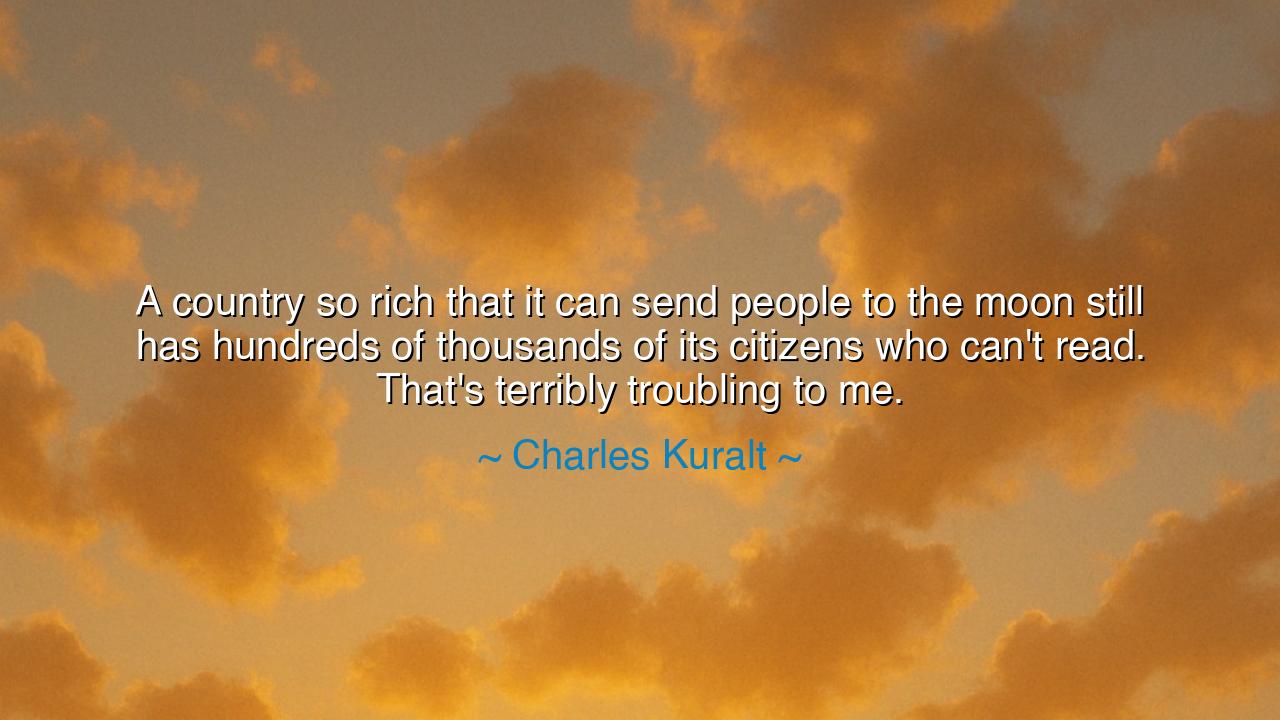
A country so rich that it can send people to the moon still has
A country so rich that it can send people to the moon still has hundreds of thousands of its citizens who can't read. That's terribly troubling to me.






In the words of Charles Kuralt, the journalist who wandered the backroads of America to tell the stories of its unseen souls, there rises a lament as old as civilization itself: “A country so rich that it can send people to the moon still has hundreds of thousands of its citizens who can’t read. That’s terribly troubling to me.” Here, Kuralt does not speak merely of wealth or poverty, but of imbalance — of a civilization soaring to the heavens yet neglecting the hearts and minds of those who dwell upon the earth. His words are a cry against the arrogance of progress without compassion, of knowledge that forgets its purpose: to enlighten, not to exclude.
The ancients, too, knew this danger well. They told of Icarus, who crafted wings of wax to chase the sun, yet fell because he did not heed the wisdom of humility. Likewise, a nation that reaches for the stars while ignoring its own people risks a fall not of body, but of spirit. Kuralt’s grief is the grief of one who has seen both the majesty and the blindness of humankind — a people who can pierce the mysteries of space, yet leave their neighbors in the shadows of ignorance. For what use is a rocket that ascends to the moon if the soul of the nation remains unlifted? What pride can there be in exploration when understanding — the simplest light of all — has not yet reached every home?
In his travels across the American landscape, Kuralt met farmers, laborers, and children — people whose lives were humble but whose hearts burned with dignity. Many could not read the words that told their nation’s story, yet they lived that story every day. It troubled him that a civilization of abundance could allow such deprivation to endure — that books might lie unopened while minds remained unawakened. He saw that illiteracy was not merely the absence of reading; it was the quiet denial of human potential. Each person denied education is a candle left unlit, a star that never rises.
We may recall the example of Frederick Douglass, born into slavery, forbidden by law to learn to read. Yet he knew that the path to freedom lay not in rebellion alone, but in knowledge. “Once you learn to read,” he said, “you will be forever free.” Douglass risked his life to master the letters of the alphabet, and through them, he found his voice — a voice that thundered across the ages. His story reminds us that literacy is not luxury; it is liberation. Kuralt’s sorrow, then, is not merely pity for the poor, but anger for the wasted greatness of a nation that fails to kindle such fire in all its citizens.
A nation’s true wealth is not counted in machines, or moon landings, or the gleam of steel and glass. It is measured in the illumination of its people — in the depth of their understanding, the breadth of their compassion, the wisdom with which they choose to live. To build without teaching is to raise towers on sand. To explore the stars while neglecting the soul is to light the heavens and leave the earth in twilight. Kuralt’s words call us back to balance: progress must walk hand in hand with empathy, and science must bow before the dignity of human need.
The ancients would have said: “He who builds a temple but leaves his children hungry has built a monument to his folly.” So too must we remember that knowledge without justice is a hollow triumph. Let us look not only to the sky, but to the faces of those still waiting for dawn — the child who cannot read a bedtime story, the elder who signs their name by memory rather than by sight. Every unread word is a silence in the song of civilization. To teach is to restore harmony.
The lesson is clear and sacred: progress must be human before it is heroic. Let no people celebrate their power while their brothers and sisters remain in darkness. Build your rockets, yes — but also build your schools. Fund your explorations — but also open your libraries. Read to your children; teach those who cannot read. For every mind awakened is a new light in the firmament of the world, and together, these lights make the heavens worth reaching.
And so, as we marvel at our towers and our triumphs, let us not forget the ground beneath them. Charles Kuralt’s lament is a reminder that the measure of a great nation is not how high it climbs, but how deeply it cares. To lift a single mind from ignorance is to honor the universe itself — for the stars we seek above are already mirrored within the human soul.






AAdministratorAdministrator
Welcome, honored guests. Please leave a comment, we will respond soon